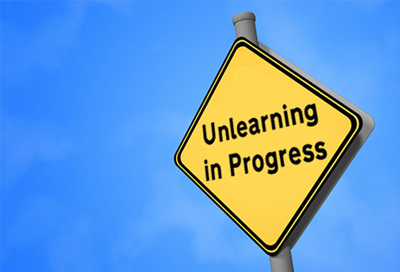As Brand Learning's Chief-Enthusiast and Head Cheerleader for the market research and insight industry, I recently attended the Warc Next Generation Research Conference.
As you would expect with a conference title like that, the agenda was dominated by the progress made in digital notably mobile and social media. However, the key takeaway, which applies to all capability building, is that in order to learn and progress you have to sometimes unlearn and undo what you know. It's not that what you know or your experience does not have value - but you have to be forever open-minded, curious and willing to listen to new thinking given the significant progress in our understanding of consumer decision-making and digital behaviour.

Here are the top 3 things I UNlearned:
- 'The market research tools of the past don't fit with the new consumer'. So says keynote speaker Dag Piper of Mars. You'll recall that the common image of market research used to be the lady with a clipboard on the High Street corner whom you did everything you could to avoid eye-contact with; it was never a good advert for the industry. It's a market research tool that has less and less relevance to the modern 'us' and affects our future ways of working and the areas we have to unlearn.
- You need to spend more time with consumers. Spending more time with consumers and using their daily tools re-emerged, as they have done recently, as critical modern ways of working to build understanding and be truly customer-centric. A new term for me is the next generation of ethnography - 'netnography' - where we look at consumer's digital behaviour as being the lead indicator of their online and offline buying behaviour. Consumers are empowered in a way they've never been before with an influential voice that's being used and listened to.
- In the digital age, less is more. Jon Sadow of Google spoke about their development of Google Consumer Surveys. Impressive was that they recently tested their approach in the 2012 US Presidential elections to predict the outcome versus established polling names such as Gallup. Google were accurate, predicting the election result to within a 2% margin. What was remarkable was that they asked only two questions. Two! Remember how this sort of thing used to take about a fifty page questionnaire to be roughly in the same ballpark of the right result?
What's most powerful about these unlearned lessons is their implications for market research specifically and marketing capability generally including:
- The increasing endorsement of Behavioural Economics; it hasn't necessarily caused me to unlearn what I already knew but it has validated what I intuitively thought to be right but had no proof to back up my belief. The marketing capability of customer-centricity has never been more relevant or important. In the debate of attitudinal versus behavioural research, Google firmly sits in behavioural. Don't ask consumers about their attitudes (they don't always do what they said they were going to do) – watch their behaviour. And it is by watching behaviour, and observing what websites have been visited, that Google can select the right sample to ask only two questions to get a very accurate prediction. Makes demographics seem dead. Another lesson unlearnt.
- The Power of Anonymity. Online research is more honest research because cultural norms, such as the Brits being polite before being honest, don't get in the way. Respondents say what they want with no social repercussions.
- The world's not only going digital, it's going mobile. This presents huge opportunities for the marketing and research industry. Firstly, the results of research deployed on mobile devices have been proved to be as accurate as traditional methods. Secondly, they offer respondents something that has been not only been missing but never apparent since the industry began – fun! Yes, fun! If presented in a more engaging way, for example using video on smartphones, gamification techniques or exclusive access to premium content, a respondent may agree to share their views in exchange and for it not to feel like the mind-numbing experience of a monster U&A questionnaire. It shouldn't even feel like an interview. A win-win transaction. Digital is positively disrupting the way we market in the most significant way since televisions became affordable. And the lesson here is the crucial need to stay close to your customers and develop digital capability as this area transforms our ways of working.
Some lessons learned, some unlearned.
I challenge you to challenge yourself to go and learn how to unlearn.
This post is by Craig Scott, Marketing Capability Director at Brand Learning.

